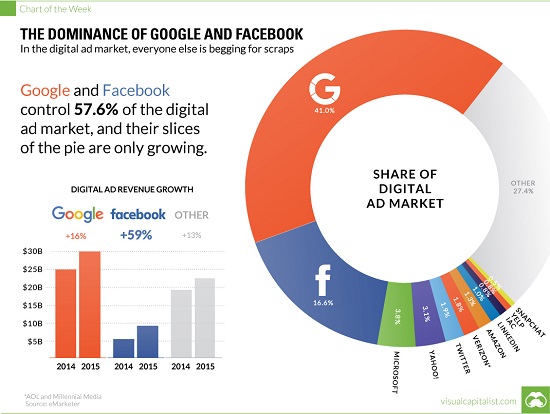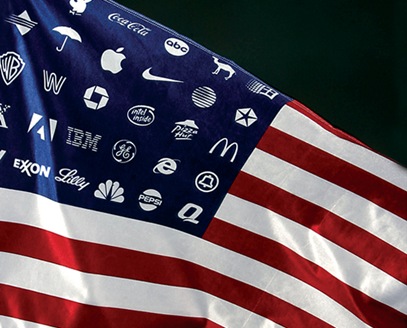Authored by Charles Hugh Smith via OfTwoMinds blog,
If targeting political extremes generates the most profit, then that’s what these corporations will pursue.
As many of you know, oftwominds.com was falsely labeled propaganda by the propaganda operation known as ProporNot back in 2016. The Washington Post saw fit to promote ProporNot’s propaganda operation because it aligned with the newspaper’s view that any site that wasn’t pro-status quo was propaganda; the possibility of reasoned dissent has vanished into a void of warring accusations of propaganda and “fake news” –which is of course propaganda in action.
Now we discover that profit-maximizing data-mining (i.e. Facebook and Google) can–gasp–be used for selling ideologies, narratives and candidates just like dog food and laundry detergent. The more extreme and fixed the views and the closer the groups are in size (i.e. the closer any electoral contest), the more profitable the corporate data-mining becomes.
Meanwhile, back at the ranch, the data-mining gets all the important stuff wrong. As correspondent GFB explains, oftwominds.com was identified as “propaganda” by data-mining, which concluded that any site that posted content that wasn’t pro-Hillary was automatically propaganda:
At least we now know why your site was flagged as a source of Russian disinformation:
Cambridge Analytica is hired by the Russians to data mine to find the most efficacious targets for their disinformation campaign – and in the course of doing research, they find that a number of individuals who visit your site have shown – in other social media actions – to have anti-Hillary, or anti-powers-that-be tendency. They conclude the number of visitors that have that data profile would suggest that it is likely most, if not all visitors to your site would likely have the same view – and so any visitor to your site gets flagged to be targeted, if possible, by the disinformation campaign.
Now look at in reverse – someone who is investigating possible unscrupulous data mining re: the campaign, and through there own data mining notice that visitors to your site get an inordinate amount of targeted disinformation – – – and they conclude (incorrectly) that oftwominds.com is likely the source of that targeting.
Setting aside the quasi-monopoly on vast data-mining of users held by Facebook and Google, we have to ask: what sort of “democracy” do we end up with when data-mining ignores the “independent” middle/moderate voters in favor of the ends of the spectrum which can be more easily whipped up into a frenzy that might just lead to a few more votes being cast (Recall that voter participation in the US is abysmally low compared to other democracies.)
It also turns out that data-mining draws all sorts of false conclusions about individuals, groups and sites. For example, if you visit a “prepper” site then the algorithms will reckon you’re pro-gun ownership. If you visit the Sierra Club website, then you’re targeted as a “social liberal,” and so on.
But in the mad rush to monetize their vast trawling of user data, Facebook, Google et al., niceties such as accuracy and the undermining of civil society don’t matter: these are privately owned corporations whose only responsibility is to maximize profits for their owners and managers.
If targeting political extremes generates the most profit, then that’s what these corporations will pursue. It’s nothing personal–maximizing profit by any means available is why they exist.


Of related interest:
Facebook Is a Utility Which Can’t Charge Its Users (July 22, 2010)
How Much of our Discord Is the Result of the “Engagement” Advert Revenue Model of Social Media? (October 24, 2017)
Should Facebook, Google and Twitter Be Public Utilities? (March 5, 2018)
* * *
My new book Money and Work Unchained is $9.95 for the Kindle ebook and $20 for the print edition. Read the first section for free in PDF format. If you found value in this content, please join me in seeking solutions by becoming a $1/month patron of my work via patreon.com.
via RSS http://ift.tt/2tZzU8F Tyler Durden

















 In New Hampshire today, President Donald Trump promised once again to tackle the opioid crisis with the full force of the federal government, reiterating his support for executing drug traffickers.
In New Hampshire today, President Donald Trump promised once again to tackle the opioid crisis with the full force of the federal government, reiterating his support for executing drug traffickers.